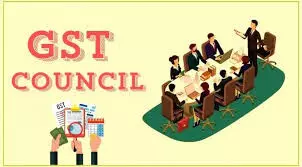GST Council Approves Compliance Relief For Businesses, Considers Major Tax Slab Overhaul
GST Council approves compliance relief for MSMEs and exporters, while considering major GST tax slab cuts. Key sectors like textiles, autos, healthcare, and insurance may benefit.
GST Council meeting 2025: Key compliance relief measures approved, major GST slab cuts under consideration.

According to sources, the Goods and Services Tax (GST) Council approved a set of measures on Wednesday that are intended to lessen the burden of compliance for businesses, especially startups and MSMEs.
Among the crucial choices were:
- Faster registration procedure: Startups and MSMEs now have a three-day approval period instead of the previous 30-day period.
- Automated GST refunds: An automated system that expedites refund processing will soon be available to exporters.
Rationalization of the GST Tax Slab on the Table
One of the council's main agenda items for the two-day meeting was to rationalize the current GST tax structure. There are currently four GST slabs: 5%, 12%, 18%, and 28%.
Among the suggestions being discussed are:
- Moving 90% of goods in the 28% bracket down to 18%.
- Shifting a chunk of items from the 12% slab to the 5% slab.
- Possible exemptions for life and health insurance premiums, which currently attract 18%.
While this could result in a revenue loss of ₹50,000 crore, officials expect the move to boost domestic consumption, ease pressure on households, and increase production across industries.
Sectors Likely to Benefit
According to sources, eight sectors stand to gain the most:
- Textiles
- Fertilisers
- Renewable energy
- Automobiles
- Handicrafts
- Agriculture
- Healthcare
- Insurance
Daily-use goods and mid-range consumer items may also become cheaper if the rationalisation is implemented.
Revenue Issues and State Resistance
However, it is anticipated that some states, such as West Bengal and Tamil Nadu, will object to the plan due to possible revenue losses. The topic of compensation is probably going to be a hot topic in council discussions because these states have elections planned for next year.
The government is also thinking of imposing a Green Energy or Health Cess on luxuries like tobacco and expensive cars in order to make up the difference. Although it will still be exempt from GST, liquor will be classified as "sin goods."
The Significance of It
According to economists, rationalization might lower the cost of goods for middle-class consumers, incentivize manufacturers to lower their prices, and possibly lead to more employment in labor-intensive sectors like electronics and automobiles.
Additionally, higher domestic demand may cushion the impact of 50% tariffs on Indian exports to the US, recently announced by Donald Trump, which are expected to affect goods worth $48 billion.
The final outcome of the GST Council’s deliberations will depend on building consensus among states, a challenge the Centre will face in the coming days.

